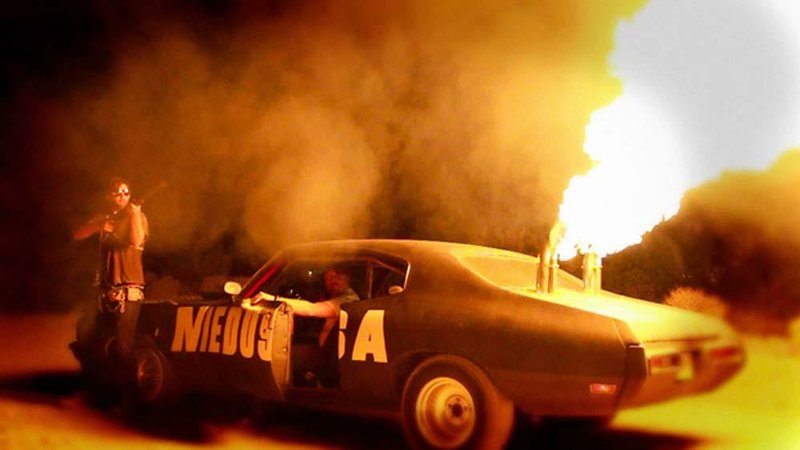LITTLE ROCK — The hook for this column about Evan Glodell’s first feature, the strangely beautiful and deeply encouraging Bellflower, is that it’s being screened Wednesday as part of the Little Rock Film Festival’s ongoing Argenta Film Series. The screening is at 7 p.m. at the Argenta Community Theater on Main Street in North Little Rock, with a reception at 6 p.m. and aQ&A session with the director afterward. Tickets are $8 at the door or can be bought through LittleRock-FilmFestival.org. Admission is free for 2012 LRFF Gold Pass holders.
And, if you happen to miss the film that evening, or want to add it to your permanent collection, it will be released on DVD on Nov. 15 (through Oscilloscope, the Blu-ray lists for $39.99, the regular DVD, $29.99).
I was disappointed that Bellflower didn’t have a theatrical run in Arkansas, in part because it provides an object lesson for the state’s burgeoning indie film movement. Glodell made Bellflower with the tools he had on hand and with the considerable skills he brought to the project. Glodell not only wrote, starred in and directed his independent film, he built three cameras to shoot it with, as well as a modified muscle car (well, a 1972 Buick Skylark) and homemade flamethrowers and other machines that are a crucial part of the film.
Bellflower is very much a homemade film, a singular vision transcribed from the mind of an auteur, abetted by his friends and some like-minded collaborators. It is a refutation of Orson Welles’ famous (pre-digital era) lament that a filmmaker was the only artist who could not afford his own tools. It stands as proof that people of modest means and uncommon ingenuity can make movies on their own. Add the requisite talent, and they can make great movies.
Not that I’m willing to call Bellflower a great movie - just one of the best of this year so far, and possibly the beginning of a remarkable career.
I love its saturated, haze - it reminds me of that infamous photo by Andres Serrano of a crucifix submerged in a golden, rosy liquid - and the ingenious tilt shift effect that Glodell achieved with his custom cameras (about half of the frame is out of focus, lending the film a dreamlike quality). I liked the mumbly industrial folk soundtrack, mostly by Jonathan Keevil but with snatches of tracks from artists like Santogold, Ratatat and Lykke Li, and I thought the performances were - for the most part, for a long time- wonderfully naturalistic and in tune with each other.
It’s essentially a love story - or more precisely a love gone-wrong story - sort of like Blue Valentine with actual explosions. I have no doubt that it’s a specifically observed film, and if it finally defaults to the structural conventions of such stories, at least it’s set in a world we haven’t seen much of before, the scrub desert that hosts the provisional suburbs of California’s Inland Empire. Living in such a place, it’s no wonder that a young man’s thoughts turn again and again to visions of a slate-cleaning apocalypse.
We meet our young heroes Woodrow (Glodell) and Aiden (Tyler Dawson) as they knock around, blowing up propane tanks and drinking. Woodrow, the more introverted of the pair, meets a girl, Milly (Jessie Wiseman), who bests him in a barroom insect-eating contest. He drives her to Texas on their first date.
But things don’t work out. And did I mention there are flamethrowers?
In interviews, Glodell has said the movie grew out of a crashed relationship he endured in his early 20s. That’s not difficult to believe, and he catches something of the nihilistic rage of the wronged romantic in his script. If it strikes some as a little too artfully distressed, well maybe it is - the fractured narrative might be taken as a fashion statement or as a legitimate presentation of youthful perception.
In any case, Bellflower has a surfeit of style and enough audacious ideas that you might not notice how its characters eventually settle into tropes in the film’s second half, as the relationship inevitably cracks up and the meltdown begins - and all that testosterone-soaked self pity catches fire.
What’s unnerving is that it’s difficult to discern from this distance exactly how Glodell feels about this; whether he intends the movie as a critique of the idiotic boys-with-toys sensibility or a celebration of it.
In a way, I suppose it doesn’t really matter whether Glodell has outgrown his own Mad Max obsession or whether Bellflower is a product of that obsession. Glodell has demonstrated a real talent here - he has produced something original, honest and at times painfully earnest.
He may never do as well again, or he might become a 21st-century giant. But he has made quite a little movie, a smoking hunk of art.
E-mail:
MovieStyle, Pages 35 on 11/04/2011
